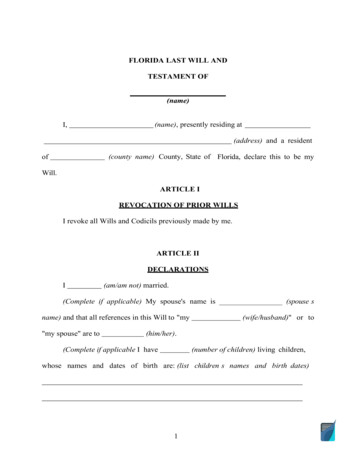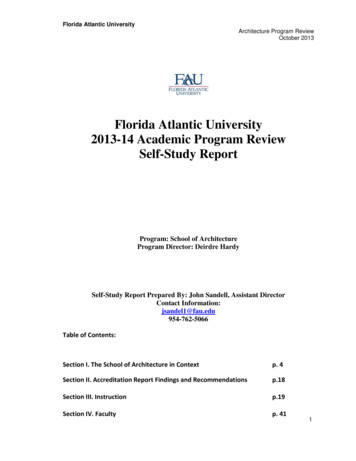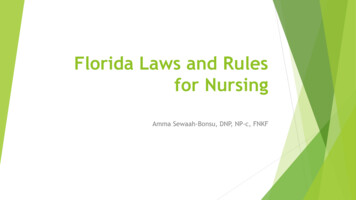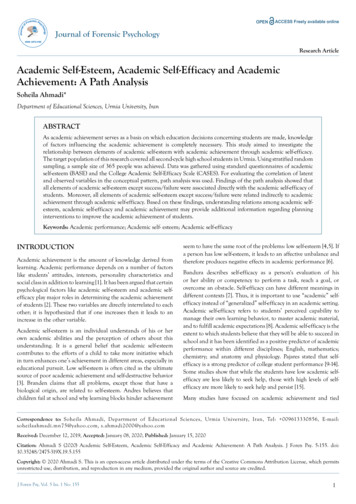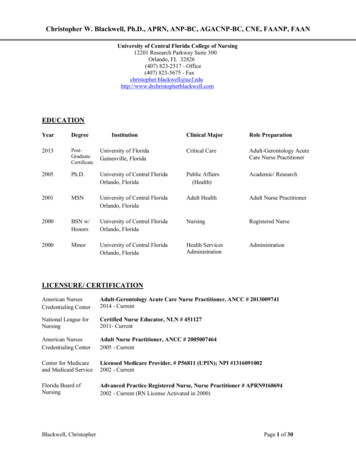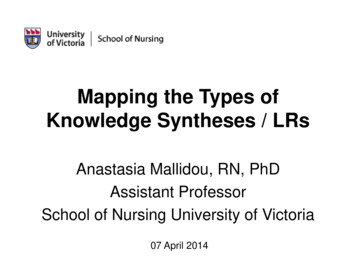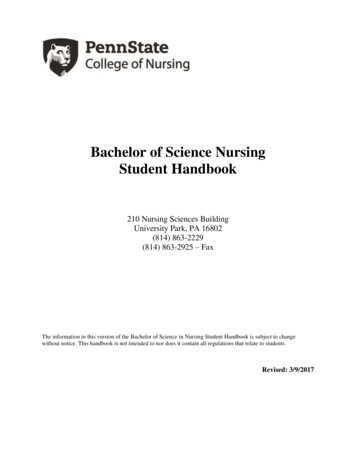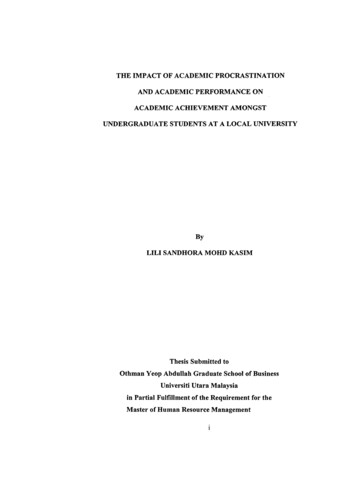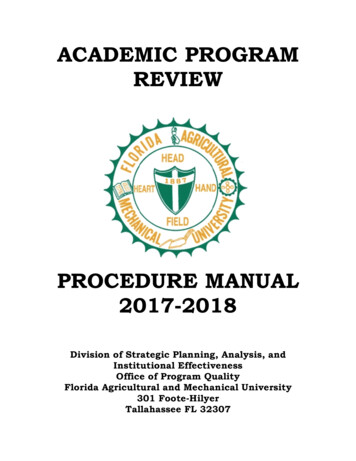
Transcription
ACADEMIC PROGRAMREVIEWPROCEDURE MANUAL2017-2018Division of Strategic Planning, Analysis, andInstitutional EffectivenessOffice of Program QualityFlorida Agricultural and Mechanical University301 Foote-HilyerTallahassee FL 32307
TABLE OF CONTENTSIntroduction . 4Procedures of Program Review . 4Initial Planning. 4Self-Study . 5External Reviewers . 6Criteria . 6Action Plan . 7Summary Report to the Board of Governors . 7Responsibilities of the Dean . 9Responsibilities of Program Review Contact . 10Responsibilities of Program Review Coordinator. 11Responsibilities of University Consultant. 12APPENDIX A . 13Program Enrollments: 2012 - 2017 . 13Degree Productivity: 2012 - 2017 . 14Annual Student Productivity (Fundable FTE Generated) . 15APPENDIX B . 19Timeline of Reviews: 2017-2018 Program Reviews . 19APPENDIX C . 21Self-Study Process, Guidelines and Format . 21APPENDIX D . 272
2017 – 2018 Program Reviews05' MajorCode05.0201'4545.0101Major Description25103 African AmericanStudiesAREA, ETHNIC,CULTURAL, ANDGENDER STUDIESAfrican American StudiesProgramLevelBachelors27181 PsychologySOCIAL SCIENCESMaster of Applied SocialSciences (MASS)45.010127182 Global Security andInternational AffairsMaster of Applied SocialSciences (MASS)Masters45.010127183 Political ScienceMaster of Applied SocialSciences (MASS)Masters45.010127185 SociologyMaster of Applied SocialSciences (MASS)Masters45.010127187 Public AdministrationMaster of Applied SocialSciences (MASS)Masters45.010127188 HistoryMaster of Applied SocialSciences (MASS)Masters45.010127189 Criminal JusticeMaster of Applied SocialSciences (MASS)Masters45.100125301 Political SciencePolitical ScienceBachelors45.10015425303 Public AdministrationPolitical ScienceBachelors54.010125101 HistoryHistoryBachelorsMasters3
IntroductionAcademic Program Reviews are a systematic evaluation of undergraduate andgraduate degree programs offered at Florida Agricultural and MechanicalUniversity (FAMU). Board of Governors (BOG) regulation 8.015 requires aseven-year cyclic review of all academic programs offered within the StateUniversity System. Under this regulation, academic programs must conduct acomprehensive program review documenting how students have demonstratedlearning outcomes and programmatic objectives consistent with the missionand strategic plan of the university.At FAMU, program reviews may be conducted as a stand-alone review ofspecific programs or as part of a specialized accreditation visit. Each reviewmust include at a minimum: (a) review and mission of the program; (b) studentproductivity data, including admissions, enrollment and graduation; (c)expected student learning outcomes; (d) assessment of whether students aremeeting learning outcomes and program objectives; (e) how the results of theassessments are used for continuous improvement of the program; (f) facultyeffort in teaching, learning, and service; and (g) efficiency of resources used forthe program.Comprehensive program reviews may enhance the quality of a program as wellas respond to future opportunities or challenges that may exist. It also providesdirection for strategic planning of the program and for the university as awhole.Procedures of Program ReviewThe academic program review process includes initial planning conducted bythe college/school and department, a self-study, external review by an expertin the discipline, discussion of the findings, action plan created by thedepartment, and a report to the Board of Governors, State University System ofFlorida.Initial PlanningGenerally, the Office of Program Quality within the Division of StrategicPlanning, Analysis and Institutional Effectiveness (SPAIE) initiates theacademic program reviews. In the fall semester preceding the year of thereview, letters are sent to the deans notifying them of the reviews that will fallunder their purview for the upcoming program review cycle. Following, anorientation is conducted for the deans and their designees who will assist andcoordinate the actual review. The orientation provides an overview of the StateUniversity System requirements for program review and direction on how theprogram reviews should be conducted.4
Prior to orientation, the deans identify a program contact and coordinator. Theprogram review contact will be responsible for oversight of all program reviewsinvolving the college, school, or institute on an on-going basis. The programreview coordinator is responsible for coordinating the collection of informationneeded for the review and compiles the self-study document using the specifiedformat in this manual. Both the program review contact and coordinatorattend the orientation with the dean and/or department chairs so that he/sheis knowledgeable of the entire program review process.If a consultant is utilized the program review contact or coordinator alsoprovides oversight in the nomination of the consultants, obtains their vitae,and arranges the site visit schedule in consultation with the Office of ProgramQuality and the Division of Academic Affairs.Self-StudyThe self-study provides the general framework for the program review andshould emphasize strengths as well as areas for improvement. Self-studies andthe supporting documentation should be brief. The self-study should bewritten with four constituencies in mind: the University, Board of Trustees,Board of Governors, and the public. In most cases it is advisable to utilize anexternal consultant to review the self-study, conduct a site visit and provide areport. The decision to utilize a consultant will be made by the Office ofProgram Quality in consultation with the dean and department Chair. It is alsorecommended that input from faculty, staff, and students be gathered andused for completion of the self-study. Student input and input from alumnimay be collected through the use of electronic or printed questionnairesurveys. The results should be summarized in the self-study.Writing of the self-study should begin shortly after the orientation conductedby the Office of Program Quality. Data collected at the central university level(see Appendix A) will be available at the orientation to include in the self-studydocument as well as in this manual. It is imperative that the colleges/schoolsand departments follow the established timeline for completion of the self-studyso that the external reviewer can conduct a comprehensive review of theprogram in the Spring.There is no set format for writing the self-study. However, it is recommendedthat the guidelines provided in Appendix C be used in the development andformatting of the self-study. The first draft of the self-study should be providedto the Office of Program Quality by May 5, 2017. The second draft should besent to the office by October 29, 2017. Final copies are due December 1, 2017.At least three copies of the final document should be submitted. Following thereview of the self-study by the Office of Program Quality, a copy will beforwarded to the external consultant for review and to prepare for the site visitin March 2017.5
External ReviewersConsultant nominees provided by the academic unit to the Office of ProgramQuality should meet the following criteria. In addition to these criteria,preferred qualifications are also listed. At least three nominees who meet thespecified criteria should be submitted to the Office of Program Quality byAugust 2017. The Office of Program Quality will contact the nominees andselect the consultant.The Office of Program Quality will also provideinformation regarding honorariums and travel. If an on-site visit by theconsultant is planned, the Office of Program Quality will determine, with theconsultant and the College, the dates for the visit.Criteria Holds the rank of Associate Professor or higher; Is from an institution outside the State of Florida; Is from an institution which offers the degree being reviewed or thedegree sought in the proposal; Has administrative experience; Has no conflict of interest with the university or individuals in theprogram; Is currently active in the discipline; and Has a respected record of scholarly activity in the discipline if reviewingdoctoral programs. Has experience evaluating programs; e.g., site visitor for accreditation,consultant for program review. Is well-respected in the discipline; Is from an institution whose program the university wishes to emulate orwith which the program wishes to be compared; and Is from a public institution or has had public institution experience.Prior to the visit, the consultant should review all information provided by theuniversity. While conducting the visit, it is recommended that the consultantreview the programs’ self-study and conduct an assessment of the programpaying close attention to student learning outcomes and assessment, facultyeffort and scholarship, fiscal and physical resources and recruitment andretention of students. These suggestions are not all inclusive. The consultantshould feel free to make recommendations in any aspects of the program asdeemed appropriate to the quality of student learning, organization, andinstruction. It is expected that the external reviewer not only comment on thestrengths and areas of improvement, but also make note of areas in which theprogram has excelled or would be considered exemplary.Recommendations included in the consultant’s reports should be made in twocategories: those which are within the purview of the program to implement,6
and those which may require some decisions or resources at the college,school, institute or university level. The final report should focus on findings.Any recommendations that develop out of the program review must besupported by review findings. Preliminary findings of the report should beprovided to university administrators at the exit interview. The final reportshould be provided to the Office of Program Quality within two weeks after thesite visit.The Office of Program Quality will prepare the contract for theconsultant/external reviewer.This contract will cover all of the duties,responsibilities, timeframe for the performance of these tasks, and method ofpayment for the honorarium. The Office of Program Quality using the followingguidelines for expenses will prepare travel authorization and travelreimbursement forms for the consultant:Hotel Accommodations (cost plus tax)Meals @ 36/dayMileage @ 0.445/mile (if private car is used to and from airport)Airline ticket (coach)Federal Express or express mail cost for mailing reports to the universityAll receipts must be provided to the Office of Program Quality within fourweeks following the visit.Action PlanFollowing submission of the external reviewer’s report, the dean anddepartment chair/director are to meet with faculty to discuss the findings ofthe report. After consultation with the faculty, the department chair/divisiondirector should derive an action plan of the steps that will be completed in thenext year to address the recommendations of the consultant. The action planshould be submitted to the Office of Program Quality within three weeksfollowing receipt of the final consultant’s report.Summary Report to the Board of GovernorsThe last step in the program review process is to compile a summary report forthe Board of Governors Office, which is due in December of each year. Thesummary report should include at a minimum: (a) a brief description of theprogram, (b) responses to previous reviews, (c) major findings from the currentreview, including strengths and weaknesses, and (d) future direction of theprogram.7
RESPONSIBILITIES8
Program ReviewResponsibilities of the DeanØ Identifies a program review contact who will be responsible for oversightof all program reviews involving the college, school or institute on an ongoing basis.Ø Identifies a program review coordinator for each program or cluster ofprograms undergoing review prior to the initial meeting. In schools,which undergo only a single program, review (e.g. nursing, architecture)the program review contact may also serve as the coordinator.Ø Along with the program review contact and coordinator, attends theinitial program review meeting.Ø Reviews self-study document.Ø May provide a brief evaluation and recommendations based on selfstudy, external consultant’s report if any, and own observations.Ø Meets with the Provost to discuss the program review findings andrecommendations.Ø Develops an action plan for approval by the Provost, delineating actionsto be taken as a result of program review.Ø Follows up to ensure actions in the action plan are undertaken.9
Responsibilities of Program Review ContactØ Along with the Dean and program review coordinator, attends the initialprogram review meeting;Ø Provides guidance and oversight for all program reviews in thecollege/school/institute, from year to year;Ø Ensures that program coordinators receive any necessary assistance indeveloping the self-study and coordinating other program reviewactivities;Ø Ensures that program review coordinators meet deadlines;Ø Reviews draft self-studies to assure accuracy and quality of thedocument;Ø If consultants are utilized, provides oversight in the nomination of theconsultants, arrangements, and site visit arrangements;Ø Keeps Dean apprized of the program review activities;Ø Assists the Dean in developing the action plan subsequent to the meetingwith the Provost; and,Ø Assists the Dean in following up to ensure actions in the action plan areundertaken10
Responsibilities of Program Review CoordinatorØ Attends initial program review orientation meeting and all subsequentmeetings scheduled by the Office of Program Quality;Ø Adheres to the timeline;Ø Requests data necessary for review;Ø Seeks input and information from appropriate individuals and offices,including students;Ø Coordinates collection of information needed for the review and writes orcompiles the self-study document according to the specified format;Ø If an external consultant is to be utilized, nominates individuals to serveas consultant and obtains their vitae, arranges site visit and interviewschedules in cooperation with Dean’s Office, Provost’s Office, and theOffice of Program Quality;Ø If a consultant is to conduct a site visit, makes arrangements for personsto be interviewed. Notifies participants of the time and place formeetings;Ø Arranges for transportation for consultant from airport and hotel, and tomeetings on campus during entire site visit;Ø Arranges for refreshments, working lunches and other hospitalityarrangements, excluding entertainment, for consultant;Ø Assists Dean and Program Review Contact in drafting the action plan;Ø Assists with follow-up as assigned.11
Responsibilities of University ConsultantØ Makes travel arrangements related to program review using proceduresagreed to by the university.Ø Keeps appropriate records for travel reimbursement.Ø Reviews information provided by university in preparation for site visits.Ø Makes site visit.Ø Requests schedule modifications and additional interviews, data, andother information when useful.Ø Conducts the scheduled interviews for the site visit.Ø Provides preliminary findings at the exit interview with universityadministrators.Ø Develops preliminary report for the program under review andsubmits report (electronic) to the Provost’s office within two weeksafter the Site Visit (Word for Windows format is required).Ø Remains accessible for follow-up and questionsadministrators after preliminary report is submitted.ofuniversityØ Finalizes report, making any necessary corrections on factual mattersand providing additional information if requested, and submits it to theProvost’s office.Ø Submits all necessary reimbursement forms to university as soon aspossible.12
APPENDIX A2017-2018 Program Review Data**F FemaleM MaleProgram Enrollments: Fall 2012 – Spring 2017Table 1Degree and LevelCIP CodeProgram TitleMajor CodeBachelorsMastersDoctorateTable 2Fall 2012Fall 2013Fall 2014Fall 2015Fall 2016Lower DivisionUndergraduateUpper DivisionUndergraduateTotal UndergraduateMaster'sTotalGraduateLower DivisionUndergraduateUpper DivisionUndergraduateTotal UndergraduateMaster's13
Total GraduateLower DivisionUndergraduateUpper DivisionUndergraduateTotal UndergraduateLower DivisionUndergraduateUpper DivisionUndergraduateTotal UndergraduateMastersDoctorateTotal GraduateDegree Productivity: 2012 - 2017Table 3AY12-13AY13-14AY-14-15AY15-16AY16-17BMBMBBMDTable 4Course CoverageAY16-17Number of Courses Taught (MostCurrent Academic Year)Percentage of Courses Taught (MostCurrent Academic Year)Regular FacultyAdjunctsGraduate Assistants/OPSOverloadTotalAY16-17Number of Courses Taught (MostCurrent Academic Year)Percentage of Courses Taught (MostCurrent Academic Year)Regular FacultyAdjunctsGraduate Assistants/OPSOverloadTotal14
AY16-17Number of Courses Taught (MostCurrent Academic Year)Percentage of Courses Taught (MostCurrent Academic Year)Regular FacultyAdjunctsGraduate Assistants/OPSOverloadTotalAY16-17Number of Courses Taught (MostCurrent Academic Year)Percentage of Courses Taught (MostCurrent Academic Year)Regular FacultyAdjunctsGraduate Assistants/OPSOverloadTotalAnnual Student Productivity (Fundable FTE Generated)Fundable FTE Generated:Table 526.0101 – BiologyLevelFundableFTETotalFTEFundableFTE (RankedFaculty)Total FTE(RankedFaculty)FundableFTE perRankedTotal FTEperRankedFundableFTETotalFTEFundableFTE (RankedFaculty)Total FTE(RankedFaculty)FundableFTE perRankedTotal FTEperRankedLower DivisionUpper DivisionY12-13( Ranked Faculty teachingundergraduate courses andranked faculty teachinggraduate courses)TotalUndergraduateGraduate I(Masters)Graduate II(Doctoral)Total GraduateLevelLower DivisionY12-13( Ranked Faculty teachingundergraduate coursesand ranked facultyteaching graduate courses)Upper DivisionTotalUndergraduateMastersDoctoral15
Total GraduateLevelFundableFTETotalFTEFundableFTE (RankedFaculty)Total FTE(RankedFaculty)FundableFTE perRankedTotal FTEperRankedFundableFTETotalFTEFundableFTE (RankedFaculty)Total FTE(RankedFaculty)FundableFTE perRankedTotal FTEperRankedFundableFTETotalFTEFundableFTE (RankedFaculty)Total FTE(RankedFaculty)FundableFTE perRankedTotal FTEperRankedFundableFTETotalFTEFundableFTE (RankedFaculty)Total FTE(RankedFaculty)FundableFTE perRankedTotal FTEperRankedLower DivisionY13-14( Ranked Faculty teachingundergraduate courses andranked faculty teachinggraduate courseUpper DivisionTotalUndergraduateMastersDoctoralTotal GraduateFundable FTE Generated:Table 640.0501 - ChemistryLevelLower DivisionUpper DivisionY11-12( Ranked Faculty teachingundergraduate courses andranked faculty teachingGraduate courses)TotalUndergraduateGraduate I(Master's)Graduate II(Doctoral)Total GraduateLevelLower DivisionY12-13( Ranked Faculty teachingundergraduate courses andranked faculty teachingGraduate courses)Upper DivisionTotalUndergraduateGraduate I(Master's)Graduate II(Doctoral)Total GraduateLevelY13-14Lower Division16
( Ranked Faculty teachingundergraduate courses andranked faculty teachingGraduate courses)Upper DivisionTotalUndergraduateGraduate I(Master's)Graduate II(Doctoral)Total GraduateFundable FTE Generated:Table 750.0409 – Graphic DesignLevelY11-12( Ranked ty)Total FTE(RankedFaculty)Fundable FTEper RankedTotal FTEper )Total FTE(RankedFaculty)Fundable FTEper RankedTotal FTEper )Total FTE(RankedFaculty)Fundable FTEper RankedTotal FTEper RankedLower DivisionUpper DivisionTotalUndergraduateGraduate I(Master's)Graduate II(Doctoral)Total GraduateLevelY12-13( Ranked Faculty)Lower DivisionUpper DivisionTotalUndergraduateGraduate I(Master's)Graduate II(Doctoral)Total GraduateLevelY13-14( Ranked Faculty)Lower DivisionUpper Division17
TotalUndergraduateGraduate I(Master's)Graduate II(Doctoral)Total GraduateFundable FTE Generated:Table 851.2099 – Pharmaceutical ScienceYearY11-12( Ranked Faculty)Y12-13( Ranked Faculty)Y13-14( Ranked Faculty)LevelFundableFTETotalFTEFundable FTE(RankedFaculty)Total FTE(RankedFaculty)Fundable FTEper RankedTotal FTEper RankedLower DivisionUpper DivisionTotalGraduate I (Master's)Graduate II (Doctoral)Total GraduateLower DivisionUpper DivisionTotalMaster’sDoctoralTotal GraduateLower DivisionUpper DivisionTotalMaster'sDoctoralTotal Graduate18
APPENDIX BTimeline of Reviews: 2017-2018 Program ReviewsIf program review is synchronized with an accreditation review, utilize thetimeline from the accrediting body and provide a copy to the Office of theProvost and the Office of Program Quality. All other program reviews shouldfollow the timeline outlined below.Office of Program QualitySeptemberOffice of Program Quality requests and obtains necessarydata for review from the Office of Institutional Research (OIR)for the previous academic year.October/Nov.Orientation meeting with Dean or designee, coordinators forthe program reviews, and Provost or designee for preliminarydiscussion of review.School/College/DepartmentNov-MayDepartment conducts faculty meetings, using self-studyformat, and makes self-study assignments. The self-studyshould serve as the vehicle for departmental discussion andreflection. It should not be the sole responsibility of oneindividual.March-AprilFaculty examine and analyze data, and discuss implicationsfor self-study.JuneDean’s Office and program review coordinator meets withOffice of Program Quality to discuss the completed datatables for the self-study with a brief analysis of theimplicationsAugustSubmit to the Office of Program Quality the names of at leastthree nominees who meet the specified criteria. The Office ofProgram Quality will contact the nominees and select aconsultant.If an on-site visit by the consultant is planned, the Office ofProgram Quality and the Division of Academic Affairs will19
determine, with the consultant and the College/School, thedates for the visit.SeptemberIf the program serves other departments or has significantcollaborations with other departments, input from thosedepartments is sought.May – OctoberUtilizing the specified format, draft the self-study. Thefaculty, chair and dean should review the draft. Drafts for2017-2018 reviews should be submitted to the Office ofProgram Quality by October 29, 2017. Three copies of thefinal document are due by December 1, 2017.Office of Program QualityNovemberMake travel and hotel reservations and contract forconsultants.December 6Receive 3 copies of the final self-study document from thedepartment.JanuaryProvide a copy of the self-study to the consultant.(Institutional Effectiveness)Office of Program Quality and DepartmentJanuaryThe program review coordinator, in consultation with theDean and Office of Program Quality, Division of AcademicAffairs and the consultant, makes arrangements for theconsultant’s visit and provides a draft site visit schedule.FebruarySite visit schedule is finalized.February-MarchWelcome and orient consultant. Conduct actual site visit.Obtain consultant’s report (two weeks following visit).Review report and request and corrections.MayConsultant submits final report.JuneThe Program Review Summary is provided to the Board ofGovernors.July-AugustThe Department, through the Dean, submits an Action Planto the Office of Program Quality.20
APPENDIX CSelf-Study Process, Guidelines and FormatProgram Review SummaryPlease provide, in a separate document, a summary of the program review,using the attached summary format. Limit your summary to no more than5 pages.PurposeØ The purpose of the self-study is threefold:(1) to provide program faculty the opportunity to reflect on andanalyze all aspects of the program and plan for its futuredirections;(2) to help administrators and, if necessary, external consultants,understand and evaluate the program; and(3) in the case of units anticipating new degree programs, to aid inpreparing to offer the proposed program.ProcessØ All degree programs at state universities must, by BOG regulation 8.015,undergo periodic program review. Each undergraduate and graduatedegree program that is part of a periodic review completes a self-studyusing the format provided by Academic Affairs.Ø Programs that undergo specialized accreditation may utilize that processand accreditation self-study guidelines in lieu of the program review selfstudy guidelines, as long as the elements in the Self-Study format areincluded. A hard copy and an electronic copy of the accreditation selfstudy must be submitted to the Office of Program Quality prior to thedeadline. The Program Review Summary template on the BOG websitemust also be completed prior to the deadline.Ø In most cases, it is advisable to utilize an external consultant to reviewthe self-study, conduct a site visit and provide a report. The decision toutilize a consultant will be made by the Provost in consultation withDean and Department Chair. Students in the program will be part of allprogram reviews. The program should seek student input and inputfrom graduates during the development of the self-study throughquestionnaire surveys. The results should be summarized in the selfstudy. Students should be included during an external consultant’s sitevisit.21
Each college or school should designate an individual who will beresponsible for overseeing all program reviews occurring within thecollege or school and who will serve as the program review contact. Atthe beginning of a program review cycle, the Office of Program Qualitywill arrange a meeting with all individuals responsible for the programreviews occurring during that cycle to clarify the process, responsibilitiesand timelines.Ø The program review self-study report must be reviewed and approved bythe Academic Dean prior to review by the Office of Program Quality. TheDean will also complete a “Program Review Summary Form” includingrecommendations based on the external consultant’s report (if available)and his/her own observations. The Program Review Summary Report issubmitted to the Board of Governors on schedule. Once final consultantreports or accreditation reports are received, the Dean will ensure thatan action plan is developed. Subsequently, the Dean will meet with theProvost to discuss and seek approval of the action plan.Recommendations ensuing from program reviews and assessments willinform the planning and budgeting process at the school, college,institute and institutional level.Ø The Dean will provide a follow-up report one year after the action plan isdeveloped.Self-study GuidelinesØ The self-study and the program review process should provide a periodicin-depth view of the program, while building upon an on-going system ofcontinuous improvement within the program. The program faculty as awhole should participate in the development of the self-study and beinvolved in the program review process.Ø Self-studies should follow the attached outline and insert the programreview forms either in the body of the text or in the appendices. Pleasekeep narratives short and succinct, but feel free to include additionalmaterial necessary to represent programs fully. Submit the finaldocument in hardcopy (letter size, 3 copies) and electronically. Programsmay wish to include peer comparison data. If so, the measures shouldbe reviewed by the Dean and Office of Program Quality office prior todata collection.Ø Once the report is approved and finalized, an official electronic copy, in“read only” format, will be maintained in the Office of Program Quality,the Dean’s office, and with the FAMU Southern Association of Collegesand Schools (SACS) liaison.22
Format for Self-Studies1. Status of the DisciplineØ Brief description of the national status of the discipline, includingemerging issues and trends.2. ProgramØ Brief overview of programØ Mission statement for the program: Reference its relationship to collegeand institutional mission, state priorities and Board of Governorsstrategic plan as appropriate.Ø Goals and objectives of the program relative to teaching, research andpublic service.Ø Student Learning Outcomes of the program: Student learning outcomesshould identify in behavioral terms the broad skill areas students shouldmaster as a result of the program by the
which undergo only a single program, review (e.g. nursing, architecture) the program review contact may also serve as the coordinator. ! Along with the program review contact and coordinator, attends the initial program review meeting. ! Reviews self-study document. ! May provide a brief evaluation and recommendations based on self-
